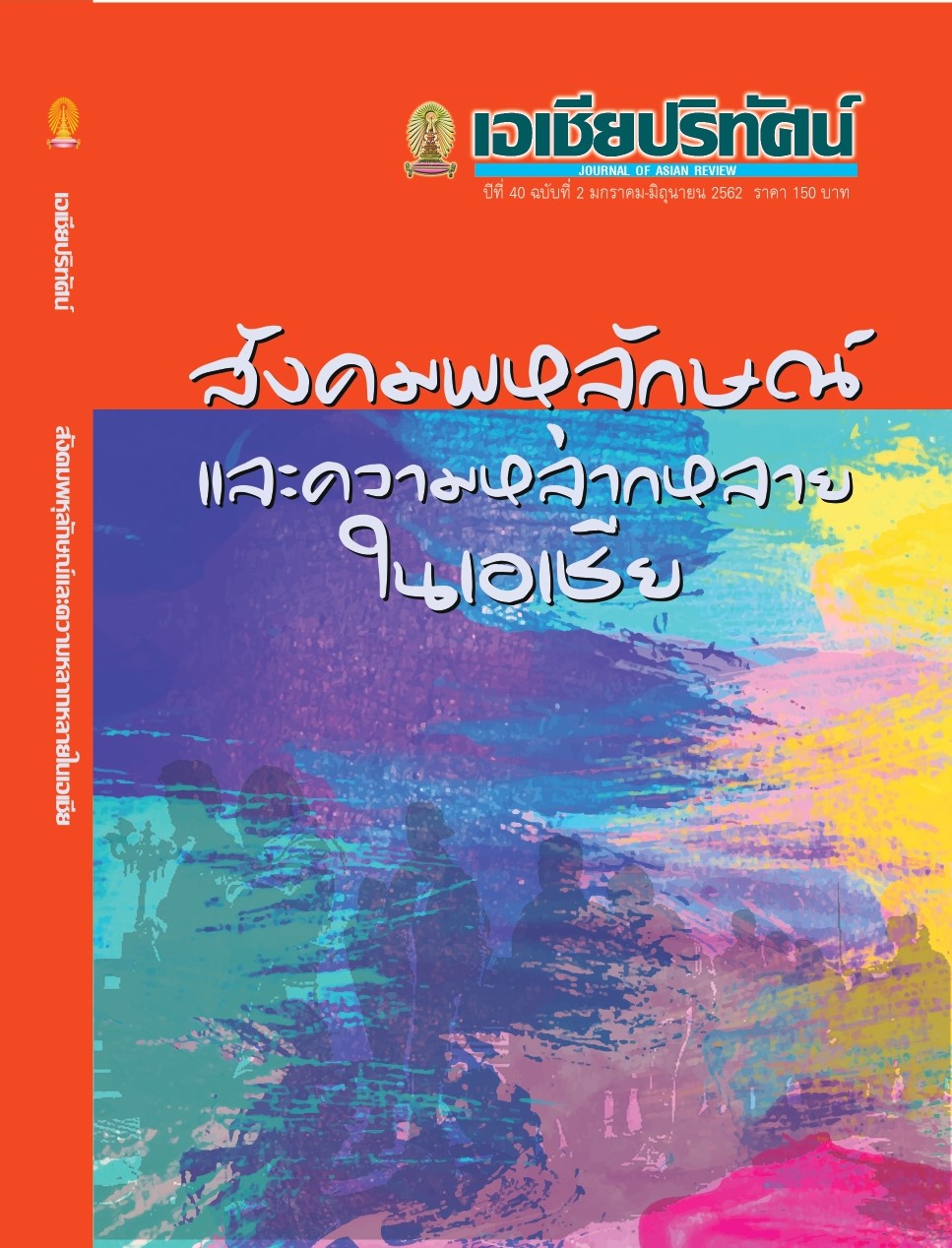ชนพื้นเมือง: มโนทัศน์และข้อถกเถียง
Main Article Content
บทคัดย่อ
ช่วงกว่าสองทศวรรษที่ผ่านมาเรื่อง “ชนพื้นเมือง”(Indigenous People) ได้กลายเป็นประเด็นที่มีกล่าวถึงกันอย่างมากทั้งในแง่มโนทัศน์และปรากฏการณ์ เรายังจะเห็นได้จากการเกิดขบวนการเคลื่อนไหวของกลุ่มชนพื้นเมืองทั้งในระดับประเทศและระดับนานาชาติ แม้ว่ารัฐจะมีการยอมรับสิทธิในการดำรงอยู่ของชนพื้นเมืองมากขึ้น แต่ชนพื้นเมืองส่วนใหญ่ก็ยังคงเป็นคนชายขอบของสังคม ยิ่งไปกว่านั้น การใช้คำว่า “ชนพื้นเมือง” อันเกี่ยวข้องกับ “สิทธิ” มักเป็นการลดทอนการตระหนักเรื่องโครงสร้างและความสัมพันธ์ทางสังคมของกลุ่มชนพื้นเมือง รวมถึงวัฒนธรรมและวิถีชีวิตอันมีเอกภาพ พร้อมกันนั้นก็ลดทอนการตระหนักถึงเงื่อนไขอันแตกต่างของการดำรงชีวิตของพวกเขาภายใต้โครงสร้างเศรษฐกิจสังคมที่ต่างออกไป ประเด็นนี้ได้เกิดการถกเถียงจากกลุ่มผู้กำหนดนโยบายด้านสิทธิชนเผ่าและและนักมานุษยวิทยาสังคม ทฤษฎี นักปฏิบัติการด้านสิทธิและกลุ่มชนพื้นเมือง ทั้งนักมานุษยวิทยาสังคมและกลุ่มผู้สนับสนุนเรื่องสิทธิของชนพื้นเมืองต่างตั้งคำถามเรื่องสิทธิวัฒนธรรมของชนพื้นเมืองด้วยมุมมองที่แตกต่างกัน บทความนี้จึงต้องการจะทบทวนถึงที่มา การปรับเปลี่ยน และข้อโต้แย้งของมโนทัศน์ของชนพื้นเมือง ซึ่งจะช่วยให้เราเข้าใจความเป็นตัวตนและการดำรงอยู่ของชนพื้นเมืองได้ชัดเจนขึ้นภายใต้รัฐชาติปัจจุบันที่ชนพื้นเมืองอาศัยอยู่นั้น
Indigenous People, Native, the Rights of Indigenous Peoples, Knowledge Production
Article Details
เอกสารอ้างอิง
1. สิริพร สมบูรณ์บูรณะ. 2558. รายงานวิจัยเรื่องกลุ่มชาติพันธุ์ กรณีกลุ่มซาไกหรือมานิในภาคใต้: จังหวัดพัทลุง ตรังและ สตูล. กรุงเทพฯ: ศูนย์มานุษยวิทยาสิรินธร (องค์กรมหาชน).
ภาษาอังกฤษ
1. Asad, T. 1973. Anthropology & the colonial encounter. London: Ithaca Press.
2. "A Working Definition, by José Martinez Cobo." 2011. IWGIA, https://www.iwgia.org/en/ news-alerts/ archive/143-uncategorised/340-a-working-definition-by-jose-martinez-cobo.
3. Balee, W. 2012. Inside Culture. CA: Left Coast Press.
4. Berger, N.D. ed. 2019. The Indigenous World 2519. Copenhagen: The International Work Group for Indigenous Affairs (IWGIA).
5. Béteille, André. 1993. The Backward Classes in Contemporary India. First Edition edition. Delhi: Oxford University Press.
6. Béteille, André. 1998. "The Idea of Indigenous People." Current Anthropology 39(2): 187-201.
7. Bowen, J.T. 2000. "Should We Have a Universal Concept of 'Indigenous People' Rights?: Ethnicity and Essentialism in the Twenty First-Century." Anthropology Today 16 (4): 12-16.
8. Castillo, R.H. 2010. "Indigeneity as a Field of Power: Multiculturalism and Indigenous Identities in Political Struggles." In The SAGE Handbook of Identities, edited by Margaret Wetherell and Chandra Talpade Mohanty. London: SAGE.
9. Chen, Kuan-Hsing. 2010. Asia as Method: Toward Deimperialization. London: Duke University Press.
10. Cobo, J. M. 1986. Study on the Problem of Discrimination Against Indigenous Populations. United Nation, https://www.un.org/development/desa/indigenouspeoples/publications/ 2014/09/martinez-cobo-study/
11. Cohn, B. 1996. Colonialism and Its Forms of Knowledge: the British in India. New Jersey: Princeton University Press.
12. Errico, S. 2017. The Rights of Indigenous Peoples in Asia: A Human rights-based Overview of National Legal and Policy Frameworks against the Backdrop of Country Strategies for Development and Poverty Reduction. Geneva: International Labour Office
13. Graham, L. R. and Penny, H. G., editeds. 2014. Performing Indigeneity: Global Histories and Contemporary Experiences. London: University of Nebraska Press.
14. Kuper, A. 1988. The invention of primitive society: Transformations of an illusion. Florence, KY, US: Taylor & Frances/Routledge.
15. Kuper, A. 2003. "The Return of the Native." Current Anthropology 44 (3): 389-402.
16. Lukas, H. 2001. “Can “They” Save “Us”, the Foragers? Indonesian and Thai Hunter-Gatherer Cultures Under Threat from Outside.” Paper presented at the Asia-Europe Seminar on Ethnic Cultures Promotion, Chiang Mai, Thailand. September 18-20.
17. Maranan, L, ed. 2015. Indigenous Peoples and ASEAN Integration. Chiang Mai: AIPP Printing Press.
18. Nandy, Ashis. 2009. The Intimate Enemy: Loss and Recovery of Self Under Colonialism. 2nd edn. Delhi: Oxford University Press. Niezen, R. 2004. A World beyond Difference: Cultural Identity in the Age of Globalization. Malden MA: Blackwell.
19. UN Declaration Rights of Indigenous People. 2007. “United Nations Declaration on the Rights of Indigenous Peoples.” https://www.un.org/development/desa/indigenouspeoples /declaration-on-the-rights-of-indigenous-peoples.html
20. Venkateswar, S. and Hughes Emma, eds. 2011. The Politics of Indigeneity: Dialogues and Reflections on Indigenous Activism. London: Zed Books.
21. Wiessner, S. 2011. “The Cultural Rights of Indigenous People: Achievements and Continuing Challenges.” European Journal of International Law 22(1): 121-140.
22. World Bank. 2018. “Indigenous Peoples.” September 28. https://www.worldbank.org/ en/topic/indigenouspeoples.


